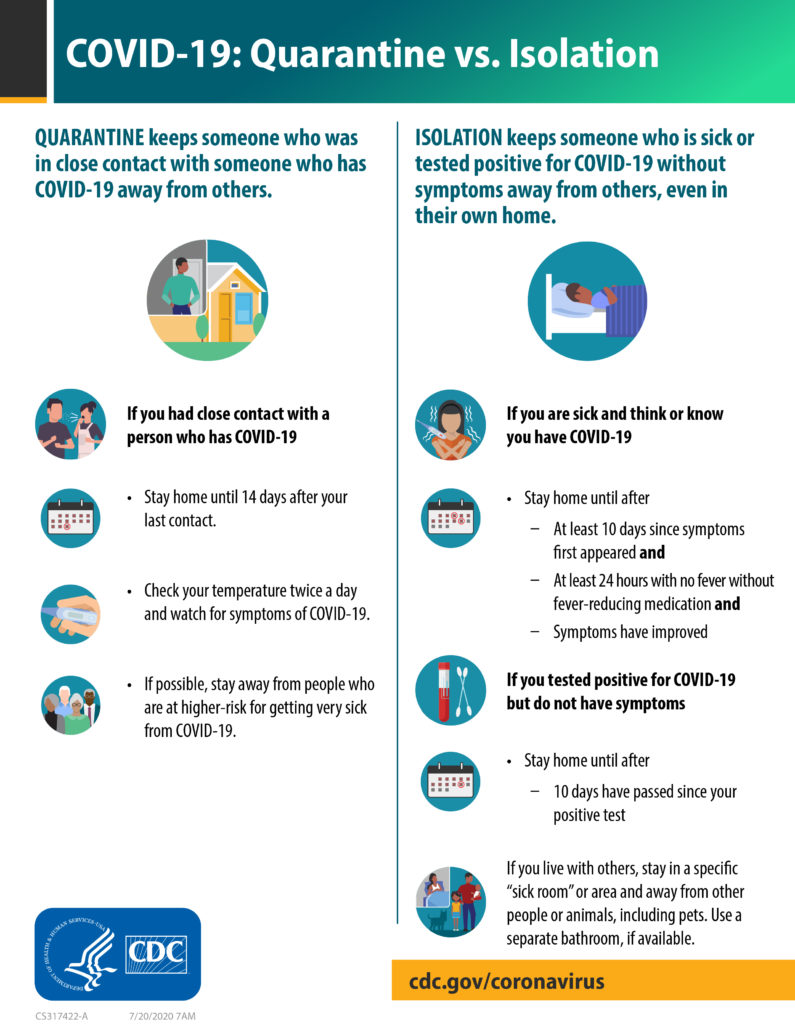Quarantine vs. Isolation
July 31, 2020
Follow Elliott Nursing and Rehabilitation on Facebook! Click Here
To see a list of frequently asked questions please Click Here


Currently, there is no evidence to suggest that handling food or consuming food is associated with COVID-19.
Coronaviruses, like the one that causes COVID-19, are thought to spread mostly person-to-person through respiratory droplets when someone coughs, sneezes, or talks. It is possible that a person can get COVID-19 by touching a surface or object, including food or food packaging, that has the virus on it and then touching their own mouth, nose, or possibly their eyes. However, this is not thought to be the main way the virus spreads.
After shopping, handling food packages, or before preparing or eating food, it is important to always wash your hands with soap and water for at least 20 seconds. If soap and water are not available, use a hand sanitizer that contains at least 60% alcohol. Cover all surfaces of your hands and rub them together until they feel dry. Remember, it is always important to follow good food safety practices to reduce the risk of illness from common foodborne pathogens.
Content Source: The Center for Disease Control and Prevention
Viral tests check samples from your respiratory system, such as a swab from the inside of your nose, to tell you if you currently have an infection with SARS-CoV-2, the virus that causes COVID-19. Some tests are point-of-care tests, meaning results may be available at the testing site in less than an hour. Other tests must be sent to a laboratory to analyze, a process that takes 1–2 days once received by the lab.
How to get a Viral Test
Here is some information that may help you make decisions about getting a viral test:
• Most people have mild illness and can recover at home without medical care. Contact your healthcare provider if your symptoms are getting worse or if you have questions about your health.
• Decisions about testing are made by state and local health departments or healthcare providers.
• If you have symptoms of COVID-19 and are not tested, it is important to stay home.
What to do After a Viral Test
• If you test positive for COVID-19, know what protective steps to take if you are sick or caring for someone.
• If you test negative for COVID-19, you probably were not infected at the time your sample was collected. However, that does not mean you will not get sick. The test result only means that you did not have COVID-19 at the time of testing. You may test negative if the sample was collected early in your infection and test positive later during your illness. You could also be exposed to COVID-19 after the test and get infected then. This means you could still spread the virus. If you develop symptoms later, you may need another test to determine if you are infected with the virus that causes COVID-19.
COVID-19 testing differs by location. If you have symptoms of COVID-19 and want to get tested, call your healthcare provider first. You can also visit your state or local health department’s website to look for the latest local information on testing.
On June 25th, Governor Beshear provided guidance to safely open visitation of nursing homes. As part of the reopening initiative, Elliott Nursing and Rehabilitation will begin to allow visitors on July 20th; however, there are specific guidelines that must be followed. Our top priority is keeping our residents and care team members safe, and we feel the guidelines below will ensure their safety.
Visits must be scheduled by using Calendly. No visits will be allowed unless it has been scheduled. Visits will be limited per day and no longer than 30 minutes time per visit.
We will allow only 2 visitors at a time and the visitors must wear masks and practice social distancing at all times which will not allow touching or hugging.
All visits will take place outside of the facility. Visitors are not allowed in care areas of the facility and due to the size and layout of our center, our only option is to restrict visits to an outside area. With that said, please keep in mind that visits may be canceled due to the weather or extreme temperatures.
If a resident is unable to visit outside, we cannot accommodate in-person visits at this time. We can set up a time to connect to the resident by way of video if you contact the Activity Department.
All visitors will be screened at the time of the visit and will be asked to self-monitor and practice all recommended precautions before and after the visit. You will be required to utilize hand sanitizer prior to the visit, wear a mask and sign a visitor attestation form.
Please do not visit if you or anyone that you have been in contact with has been ill or has been diagnosed with COVID-19. Please also report if you or anyone that you have been in contact with becomes ill or is diagnosed with COVID-19 soon after a visit.
Visits can be declined or ceased at any time. This can occur if the guidelines are not followed by visitors or if there is an onset of symptoms or new COVID-19 cases within the center, either with residents or care team members.
Notification of any changes will be posted to our Facebook page and website. It will also be mailed to residents and/or responsible parties. You can also call the center at any time to see if there are any updates or changes to the visitation policy. We will also be updating our website at www.elliottnr.com and will be adding an electronic calendar link to also schedule visits as soon as possible.
Thank you for your time and patience.
Sincerely,
Rachelle Stevens
Executive Director